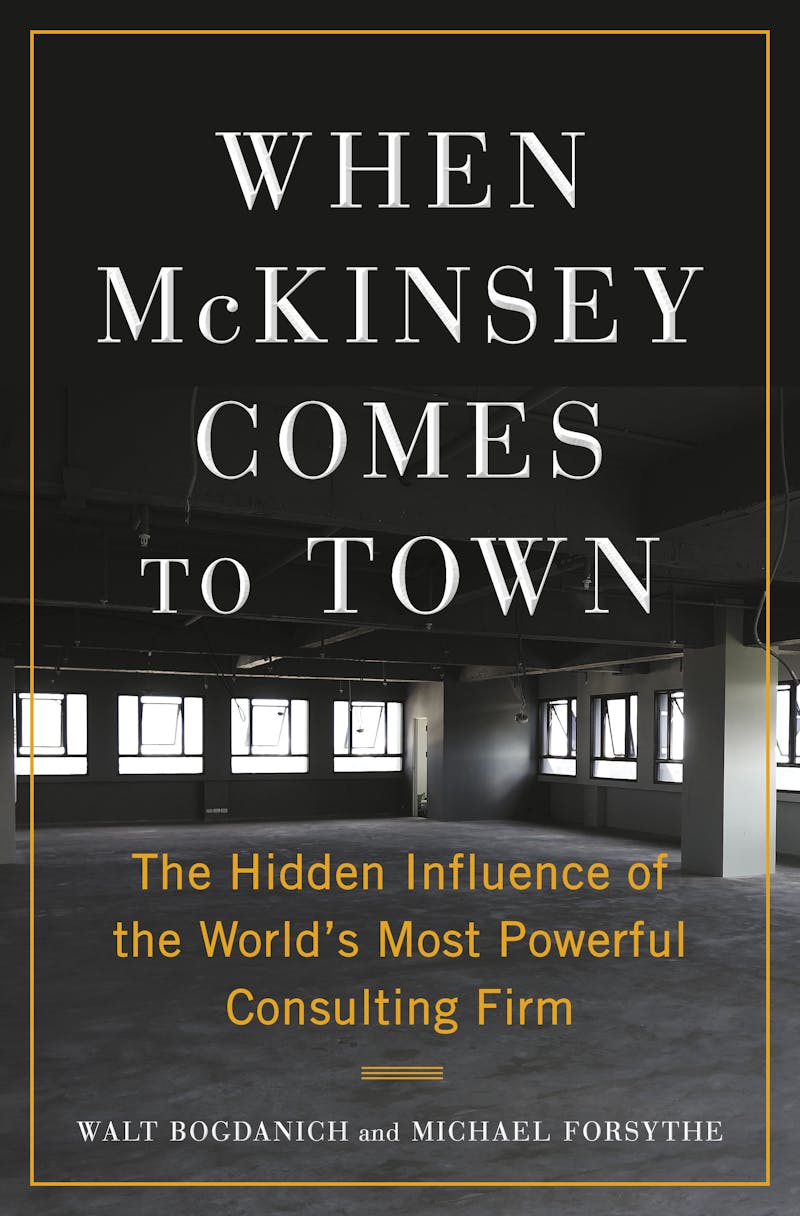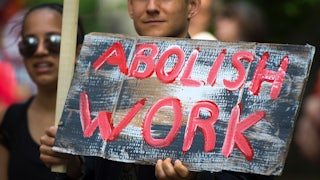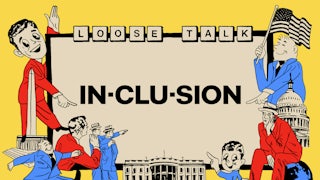At this point, the most surprising thing about McKinsey may not be its involvement in some of the greatest corporate atrocities of the twenty-first century, but the fact that this notoriously ruthless international consulting firm consciously attracts bright-eyed do-gooders to its ranks. “I came into my job as a McKinsey consultant hoping to change the world from the inside, believing that the best way to make progress is through influencing those who control the levers of power,” one former employee wrote in the magazine Current Affairs a few years ago. Business school graduates who only want to be rich naturally flock to Wall Street. But, according to investigative reporters Walt Bogdanich and Michael Forsythe, “younger, idealistic students concerned about issues like global warming, inequality, and racial justice” head to McKinsey.
And yet, despite the firm’s insistence that it’s a “values-driven” operation, McKinsey’s own internal documents tell a different story. They reveal that its consultants devised business plans to “turbocharge” OxyContin sales in the United States, while the opioid crisis was already well underway; that they worked to increase fossil fuel companies’ revenue, while publicly professing concern over climate change; and that, among other gruesome schemes the firm has concocted over the years, its consultants even furnished the brutal Saudi government with a list of dissidents.

In When McKinsey Comes to Town, Bogdanich and Forsythe assemble a damning indictment of McKinsey’s practices through an excavation of its confidential (and controversial) business recommendations over the last several decades. In recent years, some of these recommendations—McKinsey’s connections to the opioid crisis and its work with Immigration and Customs Enforcement during the Trump administration—bloomed into public scandals. But, Bogdanich and Forsythe show, the company’s misdeeds go far beyond a handful of high-profile incidents. Even phenomena like the financial collapse of 2008 and the explosion of exorbitant CEO pay—both of which have exacerbated America’s already stark economic inequality—bear McKinsey’s imprint, if you know where to look.
The curious tension between the most antisocial aspects of the McKinsey model and the earnest commitments that appear to motivate its consultants undergirds the story. Bogdanich and Forsythe, for their part, believe the company’s pronouncement that it ultimately seeks to improve the world. “There is no questioning McKinsey’s desire to do good, to give back,” they write in their epilogue. But as their scrupulous reporting suggests, the very nature of both the consulting business and profit maximization has always ensured that McKinsey was going to do damage if it was to succeed, despite all the good intentions in the world.
McKinsey was founded in 1926 and spent the rest of the twentieth century burnishing its credentials as the world’s top consulting firm. Almost from McKinsey’s conception, its reputation has rested on recruiting eager graduates out of the top business schools, swiftly weeding out those who aren’t suited to the firm’s high-octane culture, and—most crucially—putting its clients’ interests before its own. Over the last century, McKinsey has legitimately pioneered a number of industry-changing business solutions around the world, and today it counts the most profitable and well-known companies among its clients (though the official client list remains a highly guarded secret). Its alumni populate the highest ranks of government (Pete Buttigieg, Tom Cotton), the C-suites of major corporations (Meta’s Sheryl Sandberg, Google’s Sundar Pichai), and philanthropy (Chelsea Clinton). “At one time or another most Fortune 500 companies have paid McKinsey for advice,” Bogdanich and Forsythe write. “So have more than a hundred government agencies around the world.”
What has allowed this vast influence to go mostly unnoticed is McKinsey’s strict commitment to what might generously be called client confidentiality, which incidentally also keeps the firm’s own activities almost totally hidden from view. On one hand, as the authors note, McKinsey tends not to claim any public credit for its business successes; on the other, this code of silence means that it has been able to dodge both scrutiny and culpability when its business advice ends in corporate public relations disasters. In the late 1990s, for instance, when the firm was contracted by Disneyland to audit the park’s operations, McKinsey advised a program of “cost avoidance,” a bloodless euphemism for staff layoffs, fewer trainings for employees, and cutbacks to ride maintenance. In the wake of the downsizing, several parkgoers were injured or died on rides that staffers said had malfunctioned as a result of the severe cost-cutting. But as a third party, McKinsey was removed enough from the chain of command that it was able to say its consulting work was “not related to the tragic incidents at Disney.”
If McKinsey’s foundational principle of guarding its clients’ interests initially sounds vaguely noble, in practice it means that McKinsey exists primarily—if not exclusively—to help companies cut costs and juice profits. (McKinsey’s selflessness in this regard also conveniently happens to make the firm itself quite a lot of money; in 2021, it posted $10.6 billion in revenue.) McKinsey’s aptitude for increasing client profit, after all, is what helped the firm build a sterling reputation in both the private and public sectors. And though the McKinsey method has long drawn criticism—in his 2013 book, The Firm, reporter Duff McDonald famously wrote that McKinsey had been the “impetus for more layoffs than any other entity in corporate history”—it wasn’t until a few years ago that the firm found itself at the center of several full-blown public scandals.
In 2019, New York Times investigations by Bogdanich and Forsythe revealed that McKinsey had worked with Purdue Pharma to jack up OxyContin sales when hundreds of thousands of people had already died from opioids and the pharmaceutical industry was increasingly under fire. Worse still, court filings in 2020 revealed that partners had discussed destroying incriminating documents. That same year, ProPublica reported that McKinsey had consulted for ICE while authorities were separating migrant children from their parents. In a memo that scandalized even some ICE staffers themselves, the firm had suggested that ICE scale back food and medical care at detention facilities to save money. According to Bogdanich and Forsythe, the company had been so good about keeping these and other projects confidential that even a number of its own consultants were unaware of the harrowing human costs of their employer’s activities until evidence surfaced in the media.
These scandals are not mere blips. Bogdanich and Forsythe make the case that working against the public interest is business as usual for McKinsey. For one thing, its sprawling client list means that the firm is riddled with potential conflicts of interest. Since the ’90s, McKinsey has consulted for health insurance companies and managed care providers while also advising state-level government officials on privatizing Medicaid services. Likewise, the firm has simultaneously advised tobacco and vaping companies and the U.S. Food and Drug Administration office tasked with regulating those very products. While McKinsey says it has firewalls in place to prevent unethical transmissions of information across its many clients, Bogdanich and Forsythe are skeptical. “McKinsey’s specific advice to the FDA could not be determined, but the fact remains that the agency failed to identify and ‘proactively’ address vaping as a looming threat,” they write. And, in 2022, The New York Times confirmed that at least 22 McKinsey consultants had advised both Purdue and the FDA, sometimes simultaneously.
The sheer size of the corporations the firm advises has also meant that its business advice has resulted in nothing short of catastrophe for millions of American workers. In 2005, Walmart—the largest private-sector employer in the United States—hired McKinsey to help “slow the growth of employee costs, especially health care.” Walmart was already notorious for its poverty wages and bare-bones employee benefits; a significant portion of its workforce qualified for Medicaid or food stamps. The task force convened by McKinsey suggested that Walmart could further lower its expenses by increasing the number of part-time positions ineligible for the company’s health care plan and scaling back on employees’ 401(k) plans and life insurance coverage. Fifteen years later, a congressional investigation confirmed that Walmart was still one of the primary employers of Medicaid and SNAP recipients in every state studied.
If Walmart’s meager compensation practices have exacerbated a national crisis of low-wage work, McKinsey’s signature cost-cutting schemes helped facilitate the zero-sum trade-off between the company’s profits and its employees’ well-being. As writer and former McKinsey consultant Anand Giridharadas once said of the firm, “Even at its best, much of the work is about increasing investors’ share of the profits by reducing labor’s share.” Though McKinsey may indeed take pains to put its clients’ interests before its own, those “interests” are inevitably the interests of the company’s C-suite, not its rank and file.
Most troublingly, McKinsey’s influence radiates far beyond the individual companies it advises. As Bogdanich and Forsythe show, the firm was, from the beginning, an early and vociferous champion of a number of controversial practices that would ultimately remake American business to the detriment of workers. In 1950, at the height of organized labor’s strength, a McKinsey report commissioned by General Motors and later published by the Harvard Business Review found that workers’ wages were rising faster than executive pay. On McKinsey’s advice, companies began inflating CEO compensation by linking executive salaries and bonuses to higher company profits, and adding stock options to compensation packages.
That change would set off a CEO compensation arms race across the entire corporate sector that continues even today. When GM first hired McKinsey, CEO compensation was 20 times the average worker’s; as of this year, it’s a staggering 399 times higher. And it’s arguably a McKinsey success story, insofar as the firm did exactly what it was hired to do, with measurable and long-reaching results. The only hitch, of course, is that the incredible McKinsey-sanctioned windfall for CEOs comes at the expense of the rest of us. As the economist Thomas Piketty has argued, gargantuan executive compensation packages in the United States have widened the yawning gap between the one percent and everyone else. Over the same time period that executive pay has surged higher and higher, average workers’ wages have stagnated or fallen, even while worker productivity across the board has increased. And the trend only appears to have deepened in the wake of the tumultuous pandemic economy: Earlier this year, just as inflation snuffed out modest gains in workers’ earnings, The Wall Street Journal reported that CEO pay, by contrast, had “gained steam, putting compensation on pace to set a record.”
Likewise, offshoring—a cost-cutting practice that took off in the ’90s and subsequently obliterated an estimated five million American manufacturing jobs—“had no bigger cheerleader than McKinsey, which had come to see itself as more of an international firm than an American one.” Over the next two decades, McKinsey not only encouraged several of its largest clients to offshore parts of their operations, but also released a number of articles and a book extolling the practice to the wider business world. During the ’80s and ’90s, the official McKinsey literature (consumed by industry leaders and policymakers alike) was also evangelizing both financial deregulation and the virtues of credit securitization, a kind of financial black magic in which banks bundle loans and other forms of debt into assets to be resold. The toxic alchemy of an unshackled Wall Street and the industrywide enthusiasm for fast-and-loose securitization ultimately led to the financial collapse of 2008, a global crisis from which banks were famously bailed out while workers were left holding the bag.
McKinsey has protested that it had no direct involvement in most of the events that Bogdanich and Forsythe recount, let alone the macroeconomic disasters. “A recently published book fundamentally misrepresents our firm and our work,” the company said in a public statement upon the release of When McKinsey Comes to Town. “The book also seeks to associate our firm with events—like the 2008 financial crisis, a Major League Baseball cheating scandal, or safety incidents at a theme park—that we simply had nothing to do with.”
And of course it’s not the case that McKinsey consultants personally loosened screws on Disneyland rides or forced lenders to package subprime mortgages into securities to be sold and resold by Wall Street until the housing market burst. The slow-motion evisceration of the American middle class has been the consequence of a four-decade bipartisan embrace of free-market ideals like deregulation, free trade, and the systematic bulldozing of organized labor, not a single evil plan cooked up by a corner-office cabal. But the business strategies that catapulted McKinsey to international renown (not to mention billions of dollars in consulting fees) are the very same ones that have amounted to pouring accelerant on those free-market ideals. And insofar as McKinsey—like every other consulting firm—makes its money by making other companies money, it has tremendous incentives to stay its path. Or, as senior partners told one employee uneasy with the firm’s work with fossil fuel companies, “If we don’t serve coal clients, BCG [Boston Consulting Group] will.”
By the time of the 2020 presidential primaries, the McKinsey name was sullied enough that Democratic contender Pete Buttigieg was forced to explain his stint there as a consultant. He said his work at the firm had been limited to benign projects like grocery pricing: “I never worked on a project inconsistent with my values, and if asked to do so, I would have left the firm rather than participate,” he insisted on the campaign trail.
To help its employees sleep more soundly, McKinsey maintains a policy that any consultant can decline to work on projects or with clients that run counter to their principles—though, as Bogdanich and Forsythe write, it’s largely understood that turning down assignments early in one’s career will likely result in eventual dismissal from McKinsey. The 2019 revelations of the firm’s work with ICE did generate some modest internal revolts, and, in their book, Bogdanich and Forsythe interview a number of former consultants who left when they understood that their employer was betraying its stated values. One former consultant who quit in the wake of the ICE scandal said that he had initially joined the firm because of a recruiters’ pitch that he would be “uniquely positioned to do something that does on occasion help move society forward.” He later dryly told Bogdanich and Forsythe, “It might be oversold.”
Bogdanich, Forsythe, and the disillusioned consultants quoted in their book all seem to believe that McKinsey could do a better job of aligning its practices with its principles. And McKinsey wants the public to think so, too. For the last several years, the firm has advocated “stakeholder capitalism,” the private sector’s preferred term for a kinder, more socially responsible style of moneymaking that considers the needs and interests of various “stakeholders,” such as suppliers, customers, and workers, rather than operating solely for the benefit of shareholders. Among other initiatives, McKinsey has pledged $2 billion to “social responsibility efforts” and launched a racial justice think tank that addresses topics like the racial wealth gap and economic mobility. “The potential is extraordinary for business to serve as a force for good,” several partners wrote in a 2020 issue of McKinsey Quarterly.
But it’s not yet clear how this pivot stands to change McKinsey’s actual business operations, especially since this supposedly gentler variant of capitalism still presumes that corporations and the market can sort out problems like poverty and inequality and ensure the equitable distribution of necessities like housing and medical treatment. That’s an idea that has captivated lawmakers and business elites alike for decades, but has rarely worked out for the public. Take, for instance, America’s punishing market-based health care system. Treating health care as an opportunity for profit rather than a public good has been wildly lucrative for a few—including McKinsey, which, according to Bogdanich and Forsythe, has made some $200 million advising managed care companies over the last few years—but also kills tens of thousands of Americans annually and bankrupts hundreds of thousands of others.
Just a few weeks before the publication of When McKinsey Comes to Town, The New York Times revealed that the hospital chain Providence had boosted its revenue for years through a ghoulish strategy of aggressively squeezing patients for money, even those who were legally entitled to free care. Providence, the Times found, had misled low-income patients into believing they owed the hospital money, then had dispatched both hospital staff and debt collectors to badger them for payment. This practice forced a number of already poor patients deeper into financial ruin. Some described having to cut back on groceries in order to pay medical bills that never should have been sent to them; others said that nonpayment had tanked their credit scores, jeopardizing their ability to obtain housing or credit cards.
Though Providence technically operates as a nonprofit (and enjoys tax-exempt status), management had started to run the hospitals with an increasing fixation on the bottom line over the provision of medical care to those in need. Particularly after a costly 2016 merger with another hospital system, Providence executives were hungry for new sources of revenue. And the idea to rake in more money by turning the screws on patients came straight from the most prestigious consulting firm they could find: McKinsey.






